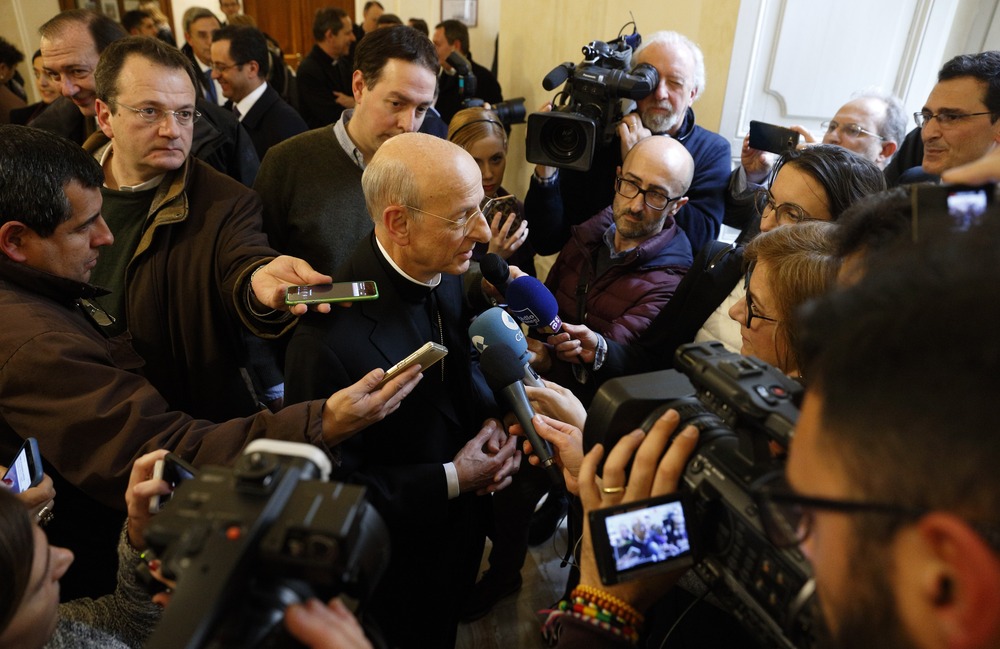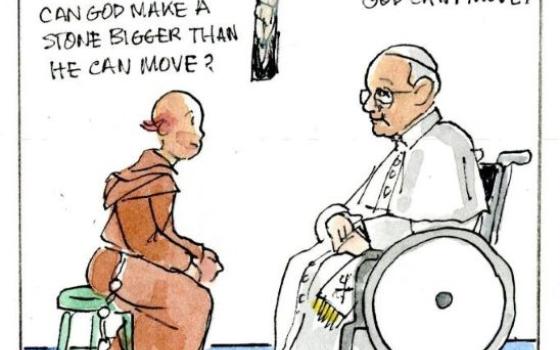
Spanish Msgr. Fernando Ocariz, head of Opus Dei, answers questions during a media opportunity at the University of the Holy Cross in Rome Jan. 24, 2017. (CNS/Paul Haring)
Argentine prosecutors issued a request that a formal inquiry be opened into allegations of human trafficking and exploitation made against Opus Dei — accusations the organization has "categorically" denied.
According to a report by the Financial Times, a 136-page request involved the personal prelature's "recruitment of at least 44 women, most of them girls and adolescents" as assistant numeraries, a women's branch within the prelature that primarily attends to the domestic needs, including cooking and cleaning, of Opus Dei centers for both men and women.
Prosecutors accused Opus Dei of subjecting the women, involved with the group between 1972 and 2015, "to living conditions comparable to servitude" in its report, which it said was the culmination of a two-year investigation after dozens of women publicly accused the prelature of exploitation, the Financial Times reported.
It also deemed the prelature's recruitment of women from low-income families as "deceitful selection" and that they were "enticed" by education and job opportunities only to be "trapped in a cycle of exploitation and abuse."
The prosecutor's office also stated the women's salaries were given to Opus Dei.
Founded in 1928 by St. Josemaría Escriva, Opus Dei (Latin for "Work of God") centers on attaining holiness through ordinary life. In 1982, St. John Paul II designated Opus Dei as a personal prelature, a canonical structure comprised of both laity and clergy. It is the only group in the church with such a distinction.
According to Opus Dei, following the Annuario Pontificio, in 2023, the prelature is comprised of an estimated 93,784 people, 2,106 of who are priests. Of the total number of members, 57% are women and 43% men.
The Argentine branch of the prelature launched a website, "Information and Context," in 2021, after the allegations were first made public. In it, Opus Dei said assistant numeraries "commit to sanctifying their work and ordinary life" and that "their work involves caring for people and centers within the Opus Dei family sphere."
"They are responsible for creating a family atmosphere and are focused on caring for the people who live in Opus Dei centers," the prelature said, adding that because "the topic of domestic work has been treated disparagingly, we believe it is very important to dignify that labor."
In its request, prosecutors asked the court to call several Opus Dei members to be questioned, including Fathers Carlos Nannei, who served as vicar general from 1991-2000; Patricio Olmos, who served from 2000-2010; Víctor Urrestarazu, who served 2014-2022; and Gabriel Dondo, who led Opus Dei's women's branch throughout those years.
Advertisement
In a statement published on its website Sept. 28, Opus Dei in Argentina "categorically" denied accusations of human trafficking and exploitation." It also said what began as a "claim for inconsistencies in pension and labor contributions" by former members "now refers to an individual claiming to be a victim of 'human trafficking' and 'labor exploitation.'"
"The impression is that to construct this accusation, a complete decontextualization of the training received by some of the women in the group and the vocation freely chosen by the auxiliary numeraries of Opus Dei has been carried out. This is a totally false accusation," the prelature said.
Although it denied the accusations, Opus Dei said that "after more than three years of similar accusations made only in the media," it found that a judicial "investigation is necessary to definitively clarify the situation."
"We reaffirm our commitment to fully cooperate with the justice system to clarify the facts and resolve the situation in a fair and transparent manner," it said.
Regarding the accusation that salaries were given to the prelature, Opus Dei explained that numeraries and assistant numeraries live in common houses which "are maintained with the contribution of those who live there."
Opus Dei explained in its information and context website that "the houses function as a family or community of solidarity where everyone has the same comforts, even if their contribution is different."
Opus Dei also noted that when the accusations were first made public, it established a "Listening and Study Commission" for current and former members "who have expressed having negative experiences."
As result of the commission's finding, Opus Dei said that a Healing and Resolution Office was established permanently and will be open to individuals who were part of Opus Dei, "who have not yet come forward, and who wish to do so to resolve any specific issues or discuss their experiences within the prelature."






